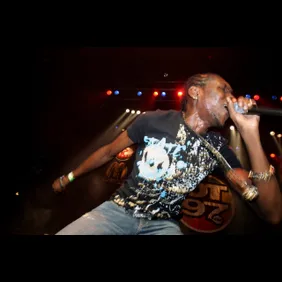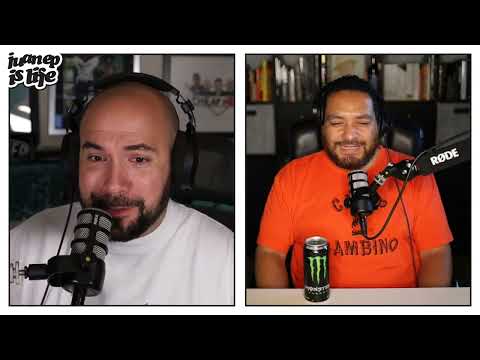How Did Vybz Kartel Make Music in Jail?

Vybz Kartel is back home. However, one thing that has lingered on everyone’s mind is how he managed to remain as prolific as he did behind bars. Sure, there’s no doubt that he recorded an incredible amount of music before he was sentenced to life in prison in 2014 for the murder of Clive “Lizard” Williams. However, the fact that for over 13 years, he continuously dominated the summers and released countless singles and projects has raised many questions surrounding his studio circumstances.
Kartel, who has been a cornerstone of dancehall, was released from prison earlier this year after he successfully won his appeal. Shortly after, he released his 12-song mixtape, First Week Out – a testament to his efficient creative flow. As he does the rounds with the media, he’s finally unveiled his secret to maintaining his relevance in the music industry throughout all these years.
Background
Vybz Kartel, born Adidja Palmer, was embroiled in a highly publicized criminal case since 2011. He was convicted in 2014 for the murder of Clive “Lizard” Williams, a charge that has led to a life sentence. The case has been controversial. Kartel maintained his innocence and his legal team highlighted procedural issues during the trial, including concerns about juror bias and the mishandling of evidence. In 2024, the UK Privy Council quashed his conviction, citing these procedural flaws, and Kartel is now a free man.
Rumors Of A Prison Studio
Hot 97’s “On Da Reggae Tip Live” at Hammerstein Ballroom on Friday night, September 2, 2005.This image:Vybz Kartel. (Photo by Hiroyuki Ito/Getty Images)
Over the years, several rumors ran rampant surrounding the circumstances that allowed Vybz Kartel to record and release music while incarcerated. Since recording music is unauthorized in prison, some suggested that he had privileged access to a professional studio, which was never actually proven. Others believed that the vault of unreleased music he left behind had enough songs to flood the streets.
It remained a mystery throughout his sentence, and in 2020, he fueled speculation even further in an interview with Billboard. “It’s a secret like the Colonel’s recipe. The true secret to success is commitment, hard work, smart work, self-analysis and most important, humility,” he responded. “Once I face a riddim (rhythm track), I’m not worldboss, just a man with a pen, paper and a track. Other artists are working hard, so I think it’s just the formula.”
When asked exactly how he’s produced so much work given his circumstances, he responded, “Many people say YES! VYBZ IS RECORDING IN PRISON!! But where’s the proof? But this is Jamaica where you don’t need proof to imprison someone. For the record, I’m not authorized to answer such ‘above pay grade’ questions so I’ll say, ‘a tree fell in the forest and no one was there to hear it.’”
Vybz Reveals His Secrets

During a recent appearance on the Juan Ep Is Life podcast, Vybz Kartel provided a rare glimpse into his life during his incarceration. He discussed his ongoing battle with Graves’ Disease, the first thing he did upon his release, and so much more. However, the most notable part of the interview came when Cipha Sounds and Peter Rosenberg delved into the logistics of Kartel’s ability to continuously release music.
Kartel explained he was able to release music through a backlog of unreleased songs. “In the first year, we had songs unreleased,” said Kartel. “But then the songs ran out and we had to do what we had to do. That’s when I started recording behind bars.” This ultimately led him to get creative by using nothing more than an iPhone.
Vybz Kartel Makeshift Studio
Kartel’s method was nothing short of ingenious. Without access to a professional studio, he improvised by using his prison-issued mattress to create a makeshift sound booth. He explained how he would position his iPhone a few feet away from his face. Then, he would wrap the mattress around his head to muffle any unwanted noise. This setup allowed him to capture vocals with surprisingly good sound quality. Afterward, he would then send it to a trusted engineer on the outside.
“I would have to Deejay directly into the iPhone,” he explained. “I would have the phone, like, 3 feet from my face and I would wrap the mattress around my head and record. It was crazy,” he explained. He used an iPad to play the instrumental while recording his vocals on the iPhone. Vybz would then send the vocals to an engineer who would mix it to sound crisp and professional.
The Inception Of “Fever”

One of Vybz Kartel’s biggest songs came during his incarceration with “Fever.” The song, which appeared on his 2016 album, King Of Dancehall, has since earned over 100 million streams on Spotify alone, according to Billboard. However, because of the rules in prison, he had to sneakily record music at odd hours of the day. “Most of the time, we had to record like at night but sometimes, it had to be like 12 o’clock when most of the officers would be on like lunch break and I would still have to be watching,” he explained. “So I’d be like, ‘fever!’ and then I’d have to get up and look. It was crazy. It was line by line!”
What’s Next For Vybz Kartel?
The expansive interview touches on several topics including some live performances, both in Jamaica and abroad. Currently, he’s planning for his comeback show on December 31st, 2024 – the Freedom Street Concert, taking place in Kingston, Jamaica. Hopefully, he’ll be touching the United States in the future. But for now, we’re happy that he’s back home.
About The Author
Aron A. is a features editor for HotNewHipHop. Beginning his tenure at HotNewHipHop in July 2017, he has comprehensively documented the biggest stories in the culture over the past few years.
Throughout his time, Aron’s helped introduce a number of buzzing up-and-coming artists to our audience, identifying regional trends and highlighting hip-hop from across the globe. As a Canadian-based music journalist, he has also made a concerted effort to put spotlights on artists hailing from North of the border as part of Rise & Grind, the weekly interview series that he created and launched in 2021.
Aron also broke a number of stories through his extensive interviews with beloved figures in the culture. These include industry vets (Quality Control co-founder Kevin “Coach K” Lee, Wayno Clark), definitive producers (DJ Paul, Hit-Boy, Zaytoven), cultural disruptors (Soulja Boy), lyrical heavyweights (Pusha T, Styles P, Danny Brown), cultural pioneers (Dapper Dan, Big Daddy Kane), and the next generation of stars (Lil Durk, Latto, Fivio Foreign, Denzel Curry). Aron also penned cover stories with the likes of Rick Ross, Central Cee, Moneybagg Yo, Vince Staples, and Bobby Shmurda.
…
